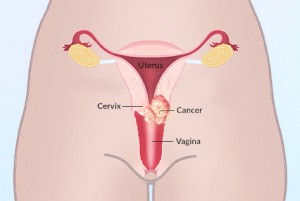 A risk factor is something that increases your chances of developing a disease. With cancer being such a dreaded disease, the question – am I at risk for cervical cancer – always plagues women. Off course, it is sometimes seen that women develop cervical cancer without being exposed to the risk factors. On the contrary, many women with these risk factors may not even develop cancer. So sometimes it does get a little tricky to pinpoint the exact risk factor for cervical cancer!
A risk factor is something that increases your chances of developing a disease. With cancer being such a dreaded disease, the question – am I at risk for cervical cancer – always plagues women. Off course, it is sometimes seen that women develop cervical cancer without being exposed to the risk factors. On the contrary, many women with these risk factors may not even develop cancer. So sometimes it does get a little tricky to pinpoint the exact risk factor for cervical cancer!
Nevertheless, knowing about risk factors for cervical cancer helps to focus on what can be changed or avoided, rather than what you cannot (eg-age, family history). However, it is still very important to know about the risk factors that cannot be changed, because women who have these risk factors can get regular Pap tests done to detect early signs of cervical cancer.
So, who is most at risk of cervical cancer? Cervical cancer risk factors are as follows-
Human papilloma virus infection (HPV)
- Women with HPV infection are those who are most at risk of cervical cancer.
- HPV is a group of 150 related viruses, out of which some cause typical growths called warts.
- HPV can infect skin and the inner lining of genitals, mouth and anus; but do not affect blood and internal organs.
- The virus is contagious and can spread from one person to another via contact through sex (vaginal, anal or oral)
- Usually HPV infection does not go away and becomes chronic. Chronic infections, with certain high-risk HPV types, do eventually cause cervical cancer.
Smoking
- Smoking is injurious to health-because when you smoke or you are exposed to smoke, you are exposed to many cancer causing chemicals that are absorbed through the lungs and are carried via blood to other organs of the body.
- Women smokers have higher chances of getting cervical cancer than the non-smokers.
- These harmful chemicals change the genetic make-up of the cervical cells and may contribute to the development of cancer.
- Smoking also makes immunity less effective in fighting infections.
Poor Immunity/Immuno-suppression
- HIV, i.e. human immunodeficiency virus, the virus that causes AIDS; destroys the immune system and makes women more prone to HPV infections.
- The immunity is responsible for destroying cancer cells and slowing their growth and speed. Hence, if the immunity is weak, cancer can develop faster than it usually does.
- Also, immunity can be hampered in group of women taking drugs that suppress immune response for eg. those being treated for autoimmune complaints or those who have had an organ transplant.
Long term use of birth control pills
- Research suggest that women who have used birth control pills for more than five years have higher risk of contracting cancer, but once they stop using pills, the risk is minimal.
- Women who have multiple sexual partners should use condoms to lower the risk of transmitting illness no matter what other form of protection she is using.
Having multiple pregnancies
- Women who have had three or more pregnancies have higher chances of developing cervical cancer. While the exact reason is unknown, possibilities could be either: because of repeated unprotected intercourse there are chances of acquiring HPV infection or because repeated pregnancies makes the immunity weak allowing easy infections.
Pregnancy at a tender age
- Women who had their first pregnancy when they were younger than 17 years are twice as likely to contract cancer later in life than the ones who had pregnancies in their late twenties.
Family history of cervical cancer
- Having a strong family history of cervical cancer is one of the risk factors for cervical cancer and increases your chances of developing cancer by two-to-three folds.
Lifestyle errors
- Diets low in fruits and vegetables for a long time can make women more prone to infections.
- Overweight women are more likely to raise their chances of developing infections and cervical cancer.
We hope this was able to answer your query about who is most at risk of cervical cancer. To know more, give us a call at +91-22-66888888 or write in to us at info@lifeforce.in. Our Associate Doctors will discuss with you how you can prevent cancer or if you have already been diagnosed with cancer, how Dr Rajesh Shah’s research based medicines can help.
– Dr Roopal Shukla, Associate Doctor to Dr Rajesh Shah, Team LifeForce





order lipitor 10mg sale lipitor pill buy generic atorvastatin 20mg
proscar 1mg us buy finasteride 5mg buy generic fluconazole for sale
ciprofloxacin 500mg brand – order generic ciprofloxacin order augmentin 375mg pills
buy baycip generic – baycip sale purchase amoxiclav for sale
ciplox cheap – purchase doryx erythromycin price
flagyl 200mg us – cefaclor brand buy azithromycin 500mg pill
stromectol australia – buy generic co-amoxiclav for sale sumycin brand
valacyclovir 500mg for sale – order valacyclovir 1000mg zovirax 400mg pill
buy ampicillin online cheap purchase ampicillin for sale how to get amoxil without a prescription
how to buy flagyl – terramycin order online azithromycin 500mg brand
buy lasix generic – coumadin where to buy buy captopril 25mg generic
buy glycomet online – lincocin 500mg pill buy lincomycin 500mg generic
order retrovir online pill – buy generic epivir over the counter buy allopurinol
clozapine 50mg canada – buy pepcid online cheap cost famotidine 40mg
order seroquel 50mg – fluvoxamine 100mg sale eskalith sale
order clomipramine 25mg without prescription – anafranil 25mg pill order sinequan pills
order generic atarax – sarafem 20mg cheap order amitriptyline sale
augmentin sale – buy augmentin 1000mg order generic ciprofloxacin 500mg
where to buy amoxil without a prescription – amoxicillin brand buy generic cipro 500mg
buy generic zithromax online – order flagyl without prescription ciplox order
buy cleocin 300mg generic – buy cheap cleocin chloromycetin order
buy ventolin cheap – allergy tablets buy cheap generic theophylline
medrol over counter – where can i buy fluorometholone order astelin sprayers
buy desloratadine pills for sale – buy zaditor 1 mg order generic ventolin inhalator
micronase brand – buy dapagliflozin online cheap buy forxiga pills
brand metformin – brand sitagliptin 100mg order acarbose online
cheap repaglinide – order empagliflozin 25mg without prescription buy empagliflozin 25mg pills
buy nizoral 200mg generic – how to get butenafine without a prescription buy itraconazole 100mg without prescription
where can i buy famvir – order famvir 500mg pill order valaciclovir 1000mg pill
buy cheap lanoxin – order labetalol 100mg order lasix 40mg for sale
lopressor 100mg price – benicar 20mg oral adalat 10mg tablet
buy generic microzide over the counter – lisinopril 5mg uk bisoprolol pills
buy nitroglycerin online cheap – where can i buy combipres valsartan pills
simvastatin kitty – gemfibrozil kick atorvastatin midst